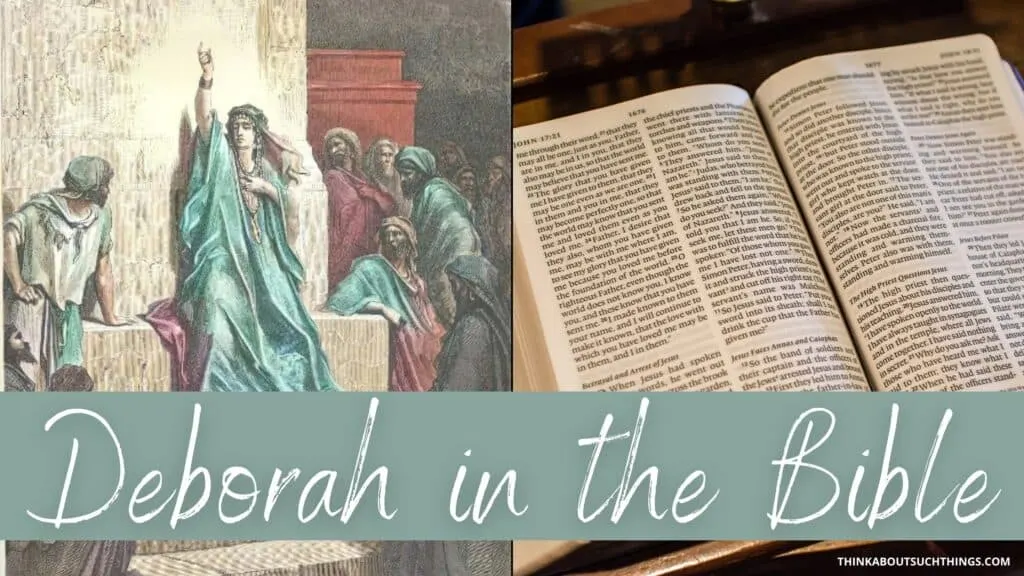In this article, we will explore the different characteristics of Deborah in the Bible and how we can learn from her life, leadership, and ministry. So, grab your Bible, and let’s dig in…
As we continue our study of the Judges of the Bible let’s take a look at the only female judge, Deborah! Deborah stands out as a remarkable person whose role in Israel is discussed in Judges 4 and 5. Though the Bible does not say much about Deborah, and she is mentioned nowhere except for these two chapters, her actions were so profound that they are still being discussed today. Let’s look at some of Deborah’s characteristics and see what they mean to us Christians.
Deborah was unique in her leadership approach. She exhibited wisdom, boldness, obedience, genuine humility, and exceptional leadership ability. She wasn’t distracted by the cultural norms of her time, knowing her calling and functioning in it despite the circumstances around her.
That description may sound like any of a hundred different leadership speakers today, but the specific situation that Deborah found herself in shows the extent of her commitment to God and her calling. Let’s dive into Judges 4 and 5 and get to know Deborah better.

Who Was Deborah?
To understand Deborah’s characteristics, we have to look at who she was and the circumstances of her life.
The Bible tells us very little about Deborah. She is mentioned in two chapters (Judges 4 and 5) and never again. But what we do know from those chapters is the following:
- Deborah was a judge in Israel, like many others, including Joshua, Gideon, and Samson. The Judges were the leaders of Israel before there were kings.
- Deborah judged the people’s legal disputes, so she was a Judge in more than one way. The Bible says she spent her days under the “Palm of Deborah” (Judges 4:5) to resolve these disputes according to God’s law.
- Deborah was married. The Bible says she was the wife of Lappidoth, though her husband isn’t mentioned much.
- We also know that Deborah was a prophetess (Judges 4:4).
- Perhaps most remarkably, Deborah was the only female judge that Israel had. In a time when people believed women weren’t supposed to be leaders, when they were hardly mentioned in the writings, when they were barely allowed in the temple, Deborah was a judge, a prophetess, and an influential leader who got two chapters to herself in the Bible.
Especially with the last point, we know that Deborah was someone who could set an example for us as Christians. Now, let’s look at the characteristics that made her so remarkable.
Key Characteristics Of Deborah In The Bible

1. Deborah Exhibited God’s Wisdom
The people brought their quarrels, complaints, and disputes to Deborah to determine the outcome. This was such a regular occurrence that the tree under which she sat was even named after her. This shows an exceptional level of trust that the people placed in her, and quite reminiscent of king Solomon, who is often seen as the personification of wisdom in the Bible.
The people of Israel would not have trusted Deborah if her judgments did not exhibit wisdom beyond the typical “asking your neighbor for advice” type. Unfortunately, we don’t have any of her conclusions recorded for us in the Bible, but perhaps that’s a good thing. With Solomon, we can look at some of his wisdom and say, “Wow, that’s incredible. I can never be that wise.”
And yet, we can see in 1 Corinthians 2:12-13: “Now we have received not the spirit of the world, but the Spirit who is from God, that we might understand the things freely given us by God. And we impart this in words not taught by human wisdom but taught by the Spirit, interpreting spiritual truths to those who are spiritual.”
Through the Holy Spirit, we all have the wisdom of God that Solomon had. None of us can say that we don’t have that wisdom since God gave it all to us through His Holy Spirit. That’s why, like Deborah, we are to exhibit God’s wisdom in our own lives and situations that our friends and family may ask us about.
2. Deborah Exhibited Boldness And Obedience
During this time, we can see that the people of Israel had fallen into disobedience (Judges 4:1). After the death of the previous judge, Ehud, the people fell back into their old habits. The Bible doesn’t specify what exactly, but we know that it often involves idolatry and the things that go along with it.
Because of their disobedience, they fell under the power of Jabin, the king of Canaan. Under this oppressive rule, they started crying out to God again, pleading for forgiveness and salvation, and God spoke to Deborah and told her what to do.
We see in Judges 4:6 that she immediately sent for Barak and told him to gather an army to free Israel.
Think about that for a moment, and compare it to Gideon, who became the judge of Israel after Deborah. Gideon was afraid and in hiding. When God spoke to him, he asked for a sign. When he received the sign, he asked for another. Still, it wasn’t enough, so he asked for another sign. He finally obeyed after the third sign was confirmed (Judges 6:11-40).
Compare that with Deborah, who did not hesitate for one moment but took action despite how little she knew about what would happen. God said it, so she did it. That’s boldness – doing what God says despite not knowing all the details.
We often pray for boldness, while all it takes is for us to take action on the instructions of God. More often than not, there is no difference between boldness and obedience. If we as Christians can take more action like Deborah, we will see the gospel spread much faster than we have over the last few hundred years.
3. Deborah Showed True Humility
We often think of humility as being less than others and usually associate it with being a doormat or a footstool for others, and that is a fake humility.
Judges 5 contains the song that Deborah and Barak sang after their enemies had all fallen. In verse 7, we see Deborah singing, “The villagers ceased in Israel; they ceased to be until I arose; I, Deborah, arose as a mother in Israel.” Deborah, basically singing about how hopeless Israel was until she arose? That doesn’t sound like someone with the wisdom of God and the humility He expects, right?
Let’s compare that with the words of Moses in Numbers 12:3: “Now the man Moses was very meek, more than all people who were on the face of the earth.” Moses wrote the verse to tell us how humble Moses was.
We, Christians, don’t understand true Godly humility. True humility understands that, yes, we are nothing without God. But since we should be dead, and Christ should be living through us (Galatians 2:20), our humility should include the fact that it’s God doing what He’s doing through us. That means taking credit and giving glory to God. If He could use a donkey, He can certainly use us.
4. Deborah Wasn’t Distracted By The Norms Of Her Time
As mentioned, Deborah lived in a time when women received hardly any recognition. Men likely despised her leadership. This is also shown when she tells Barak that his insistence on her joining him in the fight would result in the king dying at a woman’s hand. It’s also likely why the Bible tells us so little about her; the men didn’t put too much effort into writing it down.
But, despite the apparent resistance she would likely have received, Deborah did not sit quietly or tell her husband to summon Barak. She received the word of the Lord and immediately acted on it, giving no thought to what others would say or how “lowly” she was.
This parallel does not only apply to women. Most of us have some reason to think that God would not use us, persuading us to pass the message along to a “more anointed” brother or sister instead.
Deborah’s example shows us that, when God gives us a message or an instruction, there’s a reason why He chose to give it to us and not to someone else. We must stop holding back because of our insecurities or society’s views of us. God always chooses unlikely people (just look at the twelve apostles that Jesus chose).
We are to act on what God says when He says it, whether it will be a popular move or not (1 Timothy 4:12).
5. Deborah Took Leadership And Responsibility
This point ties in closely with the last two characteristics we mentioned, but it’s worth mentioning separately.
Deborah did not wait for another prophet to anoint her as a judge over Israel. She received a gift from God and started living it out. Nobody gave her a rank or authority except God. We see the same exhibited in David, who started acting like a king even while Saul was still the official king of Israel.
We tend to wait for someone to call us into ministry. Modern society tells us to study for four years to become a pastor and then to wait until a spiritual leader ordains us into a position and gives us a title. That’s not how spiritual leadership works.
The disciples had only been with Jesus approximately six months before He sent them out to do what He did, yet we sit in church pews for 30 years or more and see ourselves unworthy to minister.
God put something in you and placed it there for a reason. It’s time to stop waiting and start acting. Don’t wait for leadership; take leadership. Not by overthrowing the church or rebelling against the leaders, but begin acting out God’s vision for your life, where you are, with what you have. God entrusts us with more as we use what He has already given us.
Deborah is an example to today’s Christians in how she understood God called her and gave her everything she needed. The expectations of the people meant nothing to her; only God’s expectations mattered. If we can be more like her and exhibit more of her character (through the Holy Spirit), we will see the glory of God more clearly in our lives and ministries.

Melissa is a passionate minister, speaker and an ongoing learner of the Bible. She has been involved in church and vocational ministry for over 18 years. And is the founder of Think About Such Things. She has the heart to equip the saints by helping them get into the Word of God and fall more in love with Jesus. She also enjoys family, cooking, and reading.
She has spoken in churches in California, Oregon, Texas, and Mexico and has been featured in Guidepost Magazine and All Recipes Magazine. Read More…
